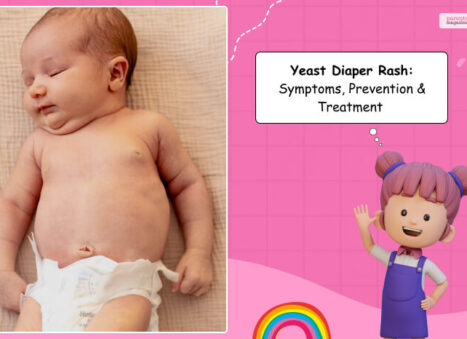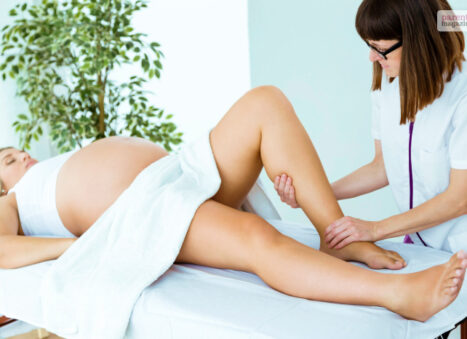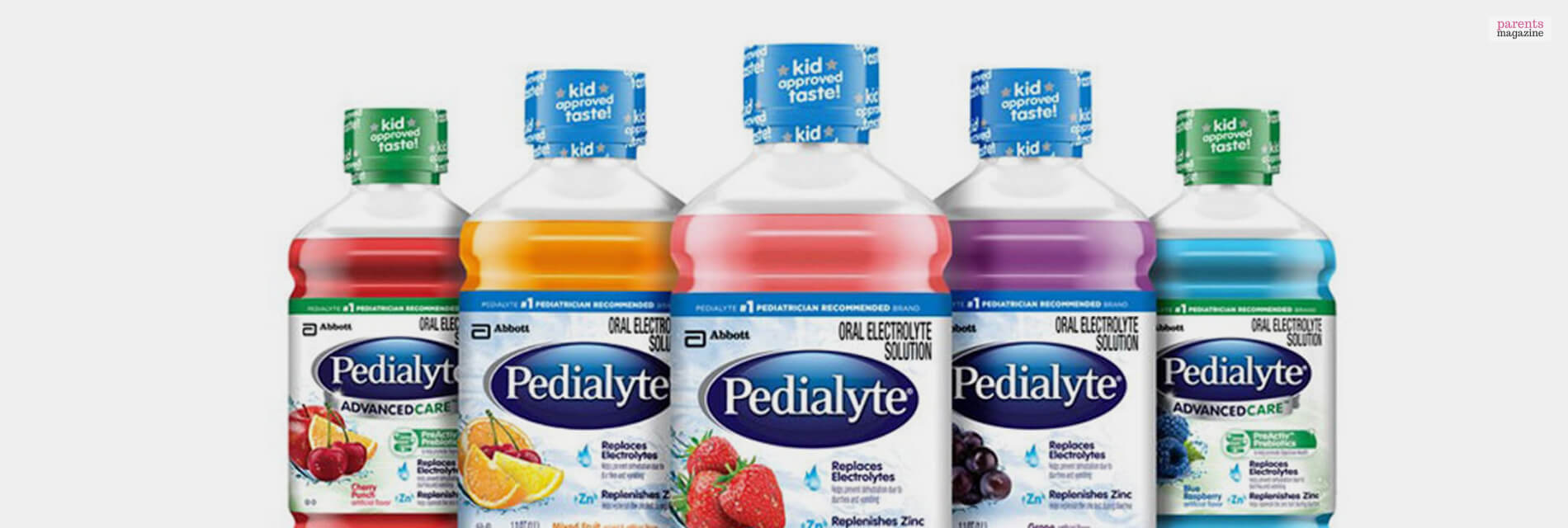
Pedialyte For Babies: Benefits, Dosage, And Safety
Pedialyte for babies is used to help prevent or reverse dehydration, specifically in children. It is an oral rehydration solution that helps children gain back strength and safe levels of hydration.
It is a combination of sugar, water, and minerals that help replace body fluids lost through sweating or illness. This product is available extensively and is available to be bought without a medical prescription. Most parents rely on this drink to help their kids stay hydrated while under the weather with bouts of diarrhea, vomiting, and other sicknesses.
But there are certain precautions necessary to be taken when giving Pedialyte to infants and young children. Here we have given a detailed overview for you to use with discretion.
Are They Suitable For Dehydration
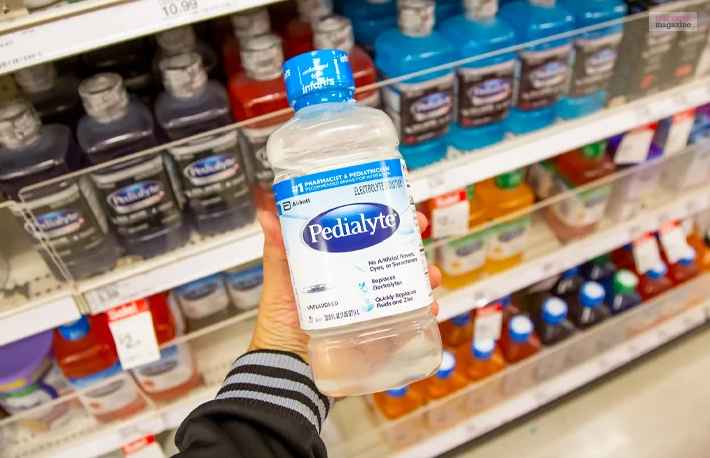
It is relatively easy for newborns and infants to drink suitable amounts of breastmilk or formula to stay hydrated if they are healthy. After completing their weaning period, they are able to drink milk, juice, water, soups, and smoothies too.
But when children fall ill, they refuse to eat or drink. This can increase their chances of dehydration. If their illness is accompanied by diarrhea or vomiting, it can cause children to lose more fluid than their intake, which further complicates the issue.
Through vomiting, sweat, and diarrhea, kids can lose electrolytes as well. This means minerals such as potassium, sodium, and chloride that are essential for the body are also being lost.
Plain water does not have many electrolytes, so it isn’t effective enough to treat dehydration, as well as an ORS solution like Pedialyte. It also contains a typical concentration of sugar that is known to help absorb more fluid and electrolytes.
When Can Babies Have Pedialyte?
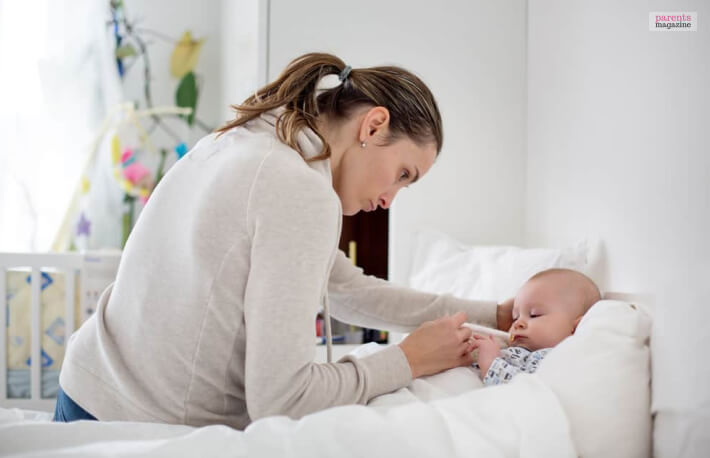
Healthcare professionals have been known to advise that your kid be given ORS as soon as they fall ill with vomiting and diarrhea. Even for symptoms such as high fever, excessive sweat, or low fluid intake, Pedialyte can help keep them hydrated.
Pedialyte for babies can be given along with formula or mother’s milk, especially for children who have not been weaned yet. They cannot replace one another.
And for children who no longer depend on the mother for nutrition, Pedialyte can be given instead of water and other liquids as frequently as possible. To keep it efficient, do not dilute the solution with other liquids such as juice, milk, or water.
Mild or moderate cases of dehydration ORS like Pedialyte can be very helpful for children. It can be used in mild cases where you can give diluted juice and then their favorite drink.
Here is a short chart for you to understand how dehydrated your child is:
| Mild dehydration | Moderate dehydration | Severe dehydration | |
| Body weight loss | 3–5% | 6–10% | More than 10% |
| Heart rate | Normal | Increased | Increased |
| Breathing | Normal | Rapid | Rapid |
| Eyes | Normal | Sunken, fewer tears when crying | Sunken, cries with no tears |
| Fontanelle — soft spot on a baby’s head | Normal | Sunken | Sunken |
| Urine output | Normal | Less than 4 wet diapers in 24 hours | Less than 1–2 wet diapers in 24 hours |
Pedialyte should be given to children below the age of 1, under medical supervision.
Dosage
This solution is available in different forms, such as ready-to-drink solutions, popsicles, and powder packages that can be mixed in water. You need not ask when can babies have Pedialyte pops, as they are safe for use.
It is ideal to give your child sips every about 15 minutes, with a slow increase of dose as and how tolerated. The packaging has dosage information for you to follow in case you are not sure, but just so you know, dosages vary from person to person. Factors such as the child’s age, weight, cause as well as the degree of dehydration must be taken into account.
Consulting your child’s pediatrician would be the best course of action.
Types Of Pedialyte
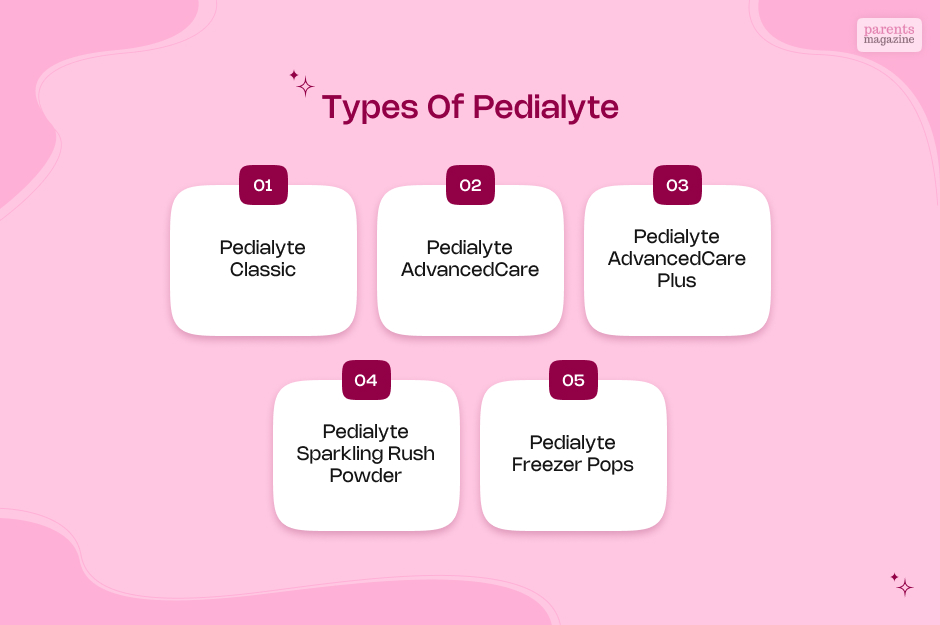
This particular oral rehydration solution comes in several different forms and flavors. Here are the Pedialyte packages available as of now:
Pedialyte Classic: This one comes in liquid form, in different flavors, and also without any flavor. It helps restore zinc and electrolytes. It also comes in powder form.
Pedialyte AdvancedCare: It helps prevent dehydration when sick. It contains PreActiv Prebiotics that help maintain a healthy digestive system.
Pedialyte AdvancedCare Plus: This one is from the Plus series, and it contains the same PreActive Prebiotics as the AdvancedCare version but with 33% more electrolytes, which makes it a lot more effective in its dosage.
Pedialyte Sparkling Rush Powder: This comes in powder form with no colors or flavors. It balances sugar and electrolytes efficiently, which can help combat mild to moderate dehydration very effectively.
Pedialyte Freezer Pops: This one is the fun packaging among all the other versions. You freeze these packages and then have them like a popsicle. These are, however, not meant for infants.
What’s Equivalent to Pedialyte?
A common alternative or equivalent product of Pedialyte is Gatorade. But it’s important to remember that both are two different types of drinks for the same purpose: dehydration.
Both are great at replenishing electrolyte losses in the human body. But, they differ in calorie content, carb, and amount of electrolyte materials present.
They are safe for infants and adults. But in most cases, they aren’t recommended for babies under 1 year. Experts recommend providing Gatorade to children who have stopped having breast milk and having fruit juice and other food instead.
Safety
Pedialyte is considered safe for most children over the age of 1.
You must also keep in mind that a few children could be allergic to some of the ingredients. Stay connected to your child’s pediatrician in case you see signs of a reaction, such as hives, rashes, redness, itchiness, trouble breathing, or swelling.
Making your own solution at home may sound tempting, but it can miss certain key ingredients relatively, worsening your child’s health. Sometimes one of the ingredients you mix could become more than the preferred dosage, which too could become harmful.
Pedialyte cannot be given to babies under the age of 1 without talking to a child health professional.
Can 1 Year Old Have Pedialyte
When not breastfeeding, a solution to dehydration can be through feeding them clear liquids infused with electrolytes. Pedialyte is an option in this case, and you can keep feeding your baby this for the first 12 to 24 months. There are options to buy oral electrolyte solutions without prescriptions over the counter.
But can you give it to a baby aged under 1 year? No, Pedialyte cannot be given to babies under the age of 1 without talking to a child health professional. You can give prediabetes to your baby if they are aged above 12 months, and you may follow a frequency of 15 minutes. But, if your child is younger than 12 months, it’s best to consult with a doctor first.
How Much Pedialyte for 10 Month Old?
As said earlier, it’s best to first consult with a pediatrician or a doctor before you start giving them Pedialyte. If they suggest giving Pedialyte to a 10-month-old child, follow the dosage that your doctor mentioned.
You can use a spoon or a tiny syringe to give a spoon or two of prediabetes to your child. The quantity should be around 5 ml to 10 ml. If your baby is older than a year, you can increase that quantity up to 15 ml to 30 ml. For a few hours, you can give it every 20 minutes.
In Conclusion
Pedialyte for babies is used to reduce and treat dehydration that is caused by diarrhea, sweating, and low fluid intake. This oral rehydration solution can be offered to the child along with formula or breastfeeding. It is as effective as IV fluids in the treatment of mild to moderate dehydration levels and in preventing further medical complications.
Parents need to make sure they have an ORS such as Pedialyte handy to give to children as soon as they are seen losing body fluids through diarrhea, vomiting, or dehydration. It is advised, however, that parents consult a medical professional before giving Pedialyte or any other ORS to children below the age of 1.
Additional Reading:
Already have an account?
Sign In
Create your account
User added successfully. Log in







